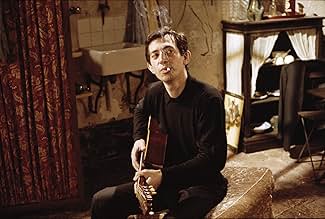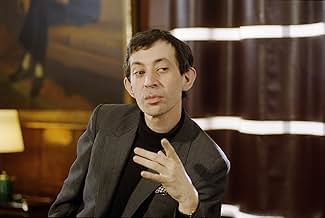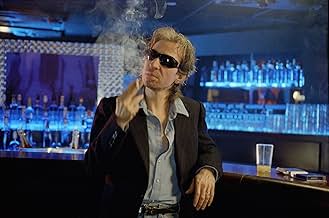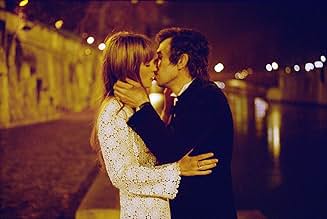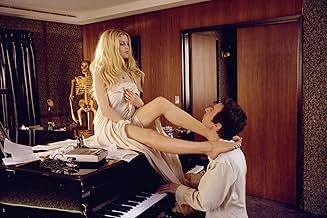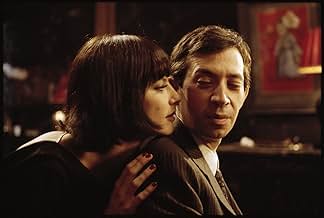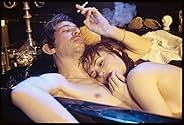IMDb रेटिंग
6.9/10
10 हज़ार
आपकी रेटिंग
अपनी भाषा में प्लॉट जोड़ेंA glimpse at the life of French singer Serge Gainsbourg, from growing up in 1940s Nazi-occupied Paris through his successful song-writing years in the 1960s to his death in 1991 at the age o... सभी पढ़ेंA glimpse at the life of French singer Serge Gainsbourg, from growing up in 1940s Nazi-occupied Paris through his successful song-writing years in the 1960s to his death in 1991 at the age of 62.A glimpse at the life of French singer Serge Gainsbourg, from growing up in 1940s Nazi-occupied Paris through his successful song-writing years in the 1960s to his death in 1991 at the age of 62.
- पुरस्कार
- 7 जीत और कुल 11 नामांकन
Dinara Drukarova
- Olga Ginsburg (la mère)
- (as Dinara Droukarova)
फ़ीचर्ड समीक्षाएं
The life story of Serge Gainsbourg had to be filmed, and as he's one of the famous Frenchmen who aren't in fact Belgian, it's only a surprise that it took so long. That his life spanned the Nazi occupation to the rise of Disco would stretch credibility if this were fiction, but as it's all more or less true the director, who is already an accomplished graphic artist, manages to lift it to the level of slightly absurd fiction. Mixing in animation, self-consciously stagey sets and a life-sized puppet as Gainsbourg's dreaded alter ego.
Even the sordid lowlife is given the big treatment, and the early days in the garret look unashamedly glamorous as they would if re-imagined for an opera set or a Salvador Dali dream sequence, as director Joann Sfar lays it on with a trowel.
The episodic nature of the story gives it a rather patchy feel though, and I couldn't help thinking that one or two episodes, especially the cute Hollywood-style musical scene with Brigitte Bardot, could have been shorter. Bardot was just one of the high-profile women Gainsbourg captured, and so was the muse of the existentialists, Juliette Greco.The casting is pretty uncanny with the possible exception of Greco, who was never that model-thin.
Gainsbourg has always been, at least outside France, more famous for being cool than for his music. But his reworking of La Marseillaise which so upset the rightwing patriots of the Seventies was nothing but excellent. I'll go back just to hear that Sly and Robbie riddim one more time.
Quite a substantial feast but it's worth building up an appetite in advance. And of course, you get Jane Birkin and... That Song.
Even the sordid lowlife is given the big treatment, and the early days in the garret look unashamedly glamorous as they would if re-imagined for an opera set or a Salvador Dali dream sequence, as director Joann Sfar lays it on with a trowel.
The episodic nature of the story gives it a rather patchy feel though, and I couldn't help thinking that one or two episodes, especially the cute Hollywood-style musical scene with Brigitte Bardot, could have been shorter. Bardot was just one of the high-profile women Gainsbourg captured, and so was the muse of the existentialists, Juliette Greco.The casting is pretty uncanny with the possible exception of Greco, who was never that model-thin.
Gainsbourg has always been, at least outside France, more famous for being cool than for his music. But his reworking of La Marseillaise which so upset the rightwing patriots of the Seventies was nothing but excellent. I'll go back just to hear that Sly and Robbie riddim one more time.
Quite a substantial feast but it's worth building up an appetite in advance. And of course, you get Jane Birkin and... That Song.
Where does this amazing film come from? Who is Joann Sfar, a director I never heard about before? The easiest answer at hand was the wikipedia entry which tells us that Sfar is a well known comics author in the fabulous French-Belgian tradition. He is of Jewish origin, and his next film is an adaptation of one of his comics successes called The Rabbi's Cat.
And suddenly all makes sense. The opening scenes of the film contain the key of the biography of French musician and poet Serge Gainsbourg as imagined by Sfar. We see Lucien Ginzburg, a Jewish kid in occupied Paris during WWII daring not only to laugh in fronde at the nose of the collaborationist police by being the first in line to receive his yellow Star of David as a sign of nobility rather than an anathema, but moreover, to transform in his mind and his sketch drawings the fat rapacious Jew on the Vichy posters in the thin, stylish, long nose and big years Gueule - the alter-ego who will guide his steps and feed his revenging self-confidence for the rest of his life.
The combination of acting and cartoon is not a new thing, but it has never been tried before in a biopic to the best of my knowledge. Sure, it is not the usual respectful biopic but it's the vision of Sfar about Ginzburg - Gainsbourg, and Sfar he says in the final text before the credits was more interested about Gainsbourg lies than by his perceived truths. Moreover, for sure Gainsbourg himself would not have appreciated a respectful film. Ironically under-titled 'Vie heroique' (heroic life) the film takes us though the artistic and especially womanizing career of Gainsbourg from the early 50s to the late 70s. We see him in the company of such French cultural icon as Boris Vian and especially of fabulous women such as Juliette Greco, Brigitte Bardot and Jane Birkin (and actually the list in the film is very partial). I enjoyed each of the scenes in this part of the film which combine style, attention to details (just follow how fashion changes marking the progress of time) and deep understanding of the atmosphere of the Parisian clubs and artistic milieu in the mythic mid-20 century. His Gueule alter-ego mentors him though this trip and when he decides to renounce his patronizing, it's the beginning of the end - the charisma goes away and the effects of his excesses slowly destroy him. Maybe a little more of his art would have provided an even more complex and balanced image of the person that Gainsbourg was - this would be my only observation.
The choice of Eric Elmosnino as Gainsbourg is excellent, he drives the character from the insecurity of the young age to the decay of the end, all the time with charm and deep empathy. He proves a perfect understanding of the intentions of the director and a full identification with the identity dilemmas of the French-Jewish Gainsbourg. Laetitia Casta is a perfect replica of Bardot. Lucy Gordon is mastering very well Jane Birkin's role. Her maturity makes even harder to explain the suicide of the young actress a few days before the film was presented in avant-premiere at Cannes.
And suddenly all makes sense. The opening scenes of the film contain the key of the biography of French musician and poet Serge Gainsbourg as imagined by Sfar. We see Lucien Ginzburg, a Jewish kid in occupied Paris during WWII daring not only to laugh in fronde at the nose of the collaborationist police by being the first in line to receive his yellow Star of David as a sign of nobility rather than an anathema, but moreover, to transform in his mind and his sketch drawings the fat rapacious Jew on the Vichy posters in the thin, stylish, long nose and big years Gueule - the alter-ego who will guide his steps and feed his revenging self-confidence for the rest of his life.
The combination of acting and cartoon is not a new thing, but it has never been tried before in a biopic to the best of my knowledge. Sure, it is not the usual respectful biopic but it's the vision of Sfar about Ginzburg - Gainsbourg, and Sfar he says in the final text before the credits was more interested about Gainsbourg lies than by his perceived truths. Moreover, for sure Gainsbourg himself would not have appreciated a respectful film. Ironically under-titled 'Vie heroique' (heroic life) the film takes us though the artistic and especially womanizing career of Gainsbourg from the early 50s to the late 70s. We see him in the company of such French cultural icon as Boris Vian and especially of fabulous women such as Juliette Greco, Brigitte Bardot and Jane Birkin (and actually the list in the film is very partial). I enjoyed each of the scenes in this part of the film which combine style, attention to details (just follow how fashion changes marking the progress of time) and deep understanding of the atmosphere of the Parisian clubs and artistic milieu in the mythic mid-20 century. His Gueule alter-ego mentors him though this trip and when he decides to renounce his patronizing, it's the beginning of the end - the charisma goes away and the effects of his excesses slowly destroy him. Maybe a little more of his art would have provided an even more complex and balanced image of the person that Gainsbourg was - this would be my only observation.
The choice of Eric Elmosnino as Gainsbourg is excellent, he drives the character from the insecurity of the young age to the decay of the end, all the time with charm and deep empathy. He proves a perfect understanding of the intentions of the director and a full identification with the identity dilemmas of the French-Jewish Gainsbourg. Laetitia Casta is a perfect replica of Bardot. Lucy Gordon is mastering very well Jane Birkin's role. Her maturity makes even harder to explain the suicide of the young actress a few days before the film was presented in avant-premiere at Cannes.
GAINSBOURG (Vie héroïque)
from the Studio Canal stable depicts the life story of Serge Gainsbourg from early childhood in the 1930's and 40's, until just before his death in 1991.
Born Lucien Ginsburg – and as an impressionable youth he felt outcast as being a Jewish child in Nazi occupied Paris in the 1940's – leading him to develop an imaginary friend who adopted an increasingly grotesque caricature / persona of himself that would lead him on to do more and more outrageous things to "rebel" his situation and to attempt to gain an element of "love" and "acceptance" from his notoriety.
A talented musician and artist, Lucien (who later was persuaded by friends to change his name to the more "acceptable" Serge Gainsbourg) became the darling of the social scene, charming his way through a succession of affairs with beautiful women – most notably Brigitte Bardot, Juliette Greco, and Jane Birkin.
I'm surprised that they didn't have a cigarette company sponsoring this movie – as the sheer amount of fags smoked during this film must be some sort of record!
After the showing of the film (at the Cineworld, Haymarket, London) we were treated to a Question and Answer session with the Writer / Director of this movie JOANN SFAR, who explained that the idea for the film came from his own graphic novel on Serge Gainsbourg penned by JOANN SFAR – and this pretty much formed the construct and ambiance of the movie – it is highly graphical and visual in it's content – much of it being fantasy visions and flashbacks within Gainsbourg's mind. Talking from the heart – Joann showed a real passion for the film, and was very open as to how the film was created.
Gainsbourg became the darling of French society with his talent and flair – but he also would court scandal and became infamous for the release of "Je t'aime... moi non plus" (which he originally wrote for Bardot) and the seemingly disrespectful reggae version of the French national anthem "La Marseillaise", but love him or loath him – you couldn't ignore him ..
The whole movie is very atmospheric, and some of the casting of this film was inspired – especially the terrific performances by Eric Elmosnini in the title role, the stunning beautiful Laetitia Casta as Brigitte Bardot, Lucy Gordon as Jane Birkin, Anna Mouglalis as Juliette Greco and Kacey Mottet Klein as the young Lucien Ginsburg.
At the end credits of the film is a dedication "to Lucy" which referred to the actress Lucy Gordon – who (the director explained) played the part of Jane Birkin in the film – and who had tragically committed suicide during the final editing parts of the film – a talented actress – and a sad loss.
At 2 hours 10mins long, in French with English subtitles GAINSBOURG will not be everyone's cup of tea but the film DOES keep you entertained and if you give it a chance, I'm sure that you will not be disappointed ...
It's not big or clever to smoke, and it doesn't make you look cool unless you happen to be Serge Gainsbourg !
GAINSBOURG is on general release from 30th July 2010
Born Lucien Ginsburg – and as an impressionable youth he felt outcast as being a Jewish child in Nazi occupied Paris in the 1940's – leading him to develop an imaginary friend who adopted an increasingly grotesque caricature / persona of himself that would lead him on to do more and more outrageous things to "rebel" his situation and to attempt to gain an element of "love" and "acceptance" from his notoriety.
A talented musician and artist, Lucien (who later was persuaded by friends to change his name to the more "acceptable" Serge Gainsbourg) became the darling of the social scene, charming his way through a succession of affairs with beautiful women – most notably Brigitte Bardot, Juliette Greco, and Jane Birkin.
I'm surprised that they didn't have a cigarette company sponsoring this movie – as the sheer amount of fags smoked during this film must be some sort of record!
After the showing of the film (at the Cineworld, Haymarket, London) we were treated to a Question and Answer session with the Writer / Director of this movie JOANN SFAR, who explained that the idea for the film came from his own graphic novel on Serge Gainsbourg penned by JOANN SFAR – and this pretty much formed the construct and ambiance of the movie – it is highly graphical and visual in it's content – much of it being fantasy visions and flashbacks within Gainsbourg's mind. Talking from the heart – Joann showed a real passion for the film, and was very open as to how the film was created.
Gainsbourg became the darling of French society with his talent and flair – but he also would court scandal and became infamous for the release of "Je t'aime... moi non plus" (which he originally wrote for Bardot) and the seemingly disrespectful reggae version of the French national anthem "La Marseillaise", but love him or loath him – you couldn't ignore him ..
The whole movie is very atmospheric, and some of the casting of this film was inspired – especially the terrific performances by Eric Elmosnini in the title role, the stunning beautiful Laetitia Casta as Brigitte Bardot, Lucy Gordon as Jane Birkin, Anna Mouglalis as Juliette Greco and Kacey Mottet Klein as the young Lucien Ginsburg.
At the end credits of the film is a dedication "to Lucy" which referred to the actress Lucy Gordon – who (the director explained) played the part of Jane Birkin in the film – and who had tragically committed suicide during the final editing parts of the film – a talented actress – and a sad loss.
At 2 hours 10mins long, in French with English subtitles GAINSBOURG will not be everyone's cup of tea but the film DOES keep you entertained and if you give it a chance, I'm sure that you will not be disappointed ...
It's not big or clever to smoke, and it doesn't make you look cool unless you happen to be Serge Gainsbourg !
GAINSBOURG is on general release from 30th July 2010
Serge Gainsbourg was many things: an artist, writer, painter, alcoholic and lover to many. He is a fascinating man who lead a fascinating life and director Joann Sfar makes a great effort here to portray it all. From the early days prior to WWII Gainsbourg was clearly going to amount to something. As he grew older and dabbled here and there in various art forms and dabbled in various women with lovers including Bridgette Bardot and Jane Birkin. Yet as he grew older Gainsbourg dabbled in more drink and drugs and this led to a troubled life.
I was to begin with fascinated by this man, full of charm and wit and ideas abounding. Yet as the film progressed I felt less and less concerned by this man and began wondering when the film might end. As interesting he was, he was also not the nicest of characters, especially in his latter years when he appears to be a drunk and grumpy man. The little touches of fantasy work well to begin with, Gainsbourg's 'imaginary friend' is interesting, but then becomes more and more grotesque and yet more annoying and often blurs the line between realism and surrealism.
Ultimately this has enough to provide an interesting account of someone who had a very full life, but for me it lost it's way part way through and therefore lost it's momentum.
More of my reviews at iheartfilms.weebly.com
I was to begin with fascinated by this man, full of charm and wit and ideas abounding. Yet as the film progressed I felt less and less concerned by this man and began wondering when the film might end. As interesting he was, he was also not the nicest of characters, especially in his latter years when he appears to be a drunk and grumpy man. The little touches of fantasy work well to begin with, Gainsbourg's 'imaginary friend' is interesting, but then becomes more and more grotesque and yet more annoying and often blurs the line between realism and surrealism.
Ultimately this has enough to provide an interesting account of someone who had a very full life, but for me it lost it's way part way through and therefore lost it's momentum.
More of my reviews at iheartfilms.weebly.com
A film, concentrating on the personality of the composer-singer. An icon of twentieth century, not only for France, but to whole Europe, perhaps even to the whole Occidental world. Basically, this work of Joann Sfar is based onto the the most remarkable points of Gainsbourg's life, and that is, oh, so comprehensible, because otherwise we'd have a film of five hours or more, nevertheless the two hours and twenty minutes seem already sufficient. And maybe even more than that.
This interpretation of Serge Gainsbourgs' life is a work of flaming colors; of ambiances which change periodically with the passage of time, ups and downs of Serge's life. At the end, regarding on all the milieus seen, we realize not only the length of the film, but as well the rapid cultural changes in France of twentieth century.
Pursuing on that, Sfar starts leading the spectator on a guided tour called ''Serge's life''. It starts from the forties when France was bearing the heavy weight of German occupation – this is where Russian Jewish boy called Lucien Ginsburg grows up. Though, it is funny, that in this part of movie, we can find all the stereotypes of France, in particularly Paris, for which the rest of the world keeps going mad even nowadays. Let's see, here we have the artistic ambiances of Monmartre, very similar to those of Belle Époque, bohemian to the bone - the cozy cafés, femmes fatales, chanson française and so on... This movie couldn't be seen as a real biography, starting already with the small phantasms in a form of giant head of a Jewish man who comes out of a Nazi poster to play and dance with little Lucien. It is the same boy, who later imagines La Gueule, a caricatured idol of himself in the childhood, but a big, fat ego and an exteriorized inner voice, during the adult life.
Already as a kid, he is a real charmer, an artist with multiple talents, seducing everyone around him. With the time passing this capacity of seduction becomes more and more sexual. It grows in geometrical progression until we meet (very intimately) Brigitte Bardot, the sex symbol of the time. We possibly couldn't denie that Laetitia Casta not only resembles very much to the authentic goddess of the time. She does give some quite authentic elements of Bardot's performance in Vadim's Et Dieu Créa La Femme. When dating Brigitte Bardot, Lucien Ginsbourg is already long gone, it's now the eccentric, successful and famous Serge Gainsbourg. The self convinced type, always with a cigarette in the corner of his lips. Sfar realizes very well, that the "best-seller" of the Gainsbourg appearances is his profile view, which, no-one in nowadays' Europe would never mistake. Perhaps, it is also that the man who plays Gainsbourg. Eric Elmosnino, from this point of view does not look like himself, but like his portrayed character. Stunning resemblance! And we can find a short reference to Antonioni's Blow-Up. It is the iconic image of Jane Birkin, wearing nothing but bright colored stockings.
Being this far, it is not difficult to see that the main leading powers of Gainsbourg's fame were... his talent and the charming trouble makers' appearances. Sfar's film has depicted them both. More, the presence of the phantasms and loud spoken dialogs with his inner him – La Gueule, points at the will to make this movie a bit different from a simple telling of a biography (assuming, that a large number already knows it). But still, I'd like to say that it is not enough to make this film a real masterpiece. The linearity is a little bit boring, and after the first half of the movie has been seen, you might want to check your watch. This is an unstoppable rolling towards the end, the only limit of the man – the end. But cinema has such wonderful possibilities to play with reality and even time, so why could we not have a little bit more interesting way of telling this exciting story? This makes the movie a bit plain, even with such wonderful and detailed work on visual elements.
The music? I guess it is inutile to say what kind and whose music we hear in the film. The relations between the music and images are well done, they illustrate time and place and whispers how Serge is doing. Whether you like it or not, it is already another question...
This interpretation of Serge Gainsbourgs' life is a work of flaming colors; of ambiances which change periodically with the passage of time, ups and downs of Serge's life. At the end, regarding on all the milieus seen, we realize not only the length of the film, but as well the rapid cultural changes in France of twentieth century.
Pursuing on that, Sfar starts leading the spectator on a guided tour called ''Serge's life''. It starts from the forties when France was bearing the heavy weight of German occupation – this is where Russian Jewish boy called Lucien Ginsburg grows up. Though, it is funny, that in this part of movie, we can find all the stereotypes of France, in particularly Paris, for which the rest of the world keeps going mad even nowadays. Let's see, here we have the artistic ambiances of Monmartre, very similar to those of Belle Époque, bohemian to the bone - the cozy cafés, femmes fatales, chanson française and so on... This movie couldn't be seen as a real biography, starting already with the small phantasms in a form of giant head of a Jewish man who comes out of a Nazi poster to play and dance with little Lucien. It is the same boy, who later imagines La Gueule, a caricatured idol of himself in the childhood, but a big, fat ego and an exteriorized inner voice, during the adult life.
Already as a kid, he is a real charmer, an artist with multiple talents, seducing everyone around him. With the time passing this capacity of seduction becomes more and more sexual. It grows in geometrical progression until we meet (very intimately) Brigitte Bardot, the sex symbol of the time. We possibly couldn't denie that Laetitia Casta not only resembles very much to the authentic goddess of the time. She does give some quite authentic elements of Bardot's performance in Vadim's Et Dieu Créa La Femme. When dating Brigitte Bardot, Lucien Ginsbourg is already long gone, it's now the eccentric, successful and famous Serge Gainsbourg. The self convinced type, always with a cigarette in the corner of his lips. Sfar realizes very well, that the "best-seller" of the Gainsbourg appearances is his profile view, which, no-one in nowadays' Europe would never mistake. Perhaps, it is also that the man who plays Gainsbourg. Eric Elmosnino, from this point of view does not look like himself, but like his portrayed character. Stunning resemblance! And we can find a short reference to Antonioni's Blow-Up. It is the iconic image of Jane Birkin, wearing nothing but bright colored stockings.
Being this far, it is not difficult to see that the main leading powers of Gainsbourg's fame were... his talent and the charming trouble makers' appearances. Sfar's film has depicted them both. More, the presence of the phantasms and loud spoken dialogs with his inner him – La Gueule, points at the will to make this movie a bit different from a simple telling of a biography (assuming, that a large number already knows it). But still, I'd like to say that it is not enough to make this film a real masterpiece. The linearity is a little bit boring, and after the first half of the movie has been seen, you might want to check your watch. This is an unstoppable rolling towards the end, the only limit of the man – the end. But cinema has such wonderful possibilities to play with reality and even time, so why could we not have a little bit more interesting way of telling this exciting story? This makes the movie a bit plain, even with such wonderful and detailed work on visual elements.
The music? I guess it is inutile to say what kind and whose music we hear in the film. The relations between the music and images are well done, they illustrate time and place and whispers how Serge is doing. Whether you like it or not, it is already another question...
क्या आपको पता है
- ट्रिवियाThe project was originally envisioned with Serge Gainsbourg's real life daughter, actress Charlotte Gainsbourg to play him in keeping with the film's surreal and fairytale-esque tone. Six months into rehearsals and preparation Gainsbourg pulled out telling director Joann Sfar, it was proving too emotionally painful and he would have to make his "beautiful film" without her. Sfar had always approached the film with her in mind and was ready to abort the project when fate lead him to Eric Elmosnino.
- गूफ़The young Gainsbourg is shown drawing left-handed, but the adult Gainsbourg becomes right-handed.
- भाव
Serge Gainsbourg: [after a man tips him while he plays the piano] What are you fucking kidding me? I'm not a jukebox!
- क्रेज़ी क्रेडिट"Pour Lucy" i.e. this was Lucy Gordon 's last film.
- इसके अलावा अन्य वर्जनEngland is the first territory to release a new cut of the film, running 14 minutes shorter than the previous version and is Joann Sfar's preferred one. Changes include -
- Deletion of the scene where young Serge pleads in vain for his mother to buy him a gun to play with, even attempting to bribe her by saying he'll work harder on the piano. This precedes the scene where he steals the gun from the shop.
- Deletion of the scene where Serge and Boris Vian walk to his apartment and the two lie in the road in an effort to stop a cab. While they wait Serge reveals he has a double that follows him around to which Vian replies his is a werewolf. However two policemen soon cut the conversation short. (This precedes Serge arriving at Boris's apartment and explains a later scene where a drunken Serge lies in the road before having the police escort to his concert)
- Longer scene of the "Baby Pop" groupies, as Gainsbourg wakes up in bed with two naked women as his Mug joyously tosses bank statements at him revealing how rich he is from "Poupée de cire, poupée de son" alone! This is the original lead in to "Qui Est In Qui Est Out".
- The groupies and party to "Qui Est In Qui Est Out" is cut short, removing Serge narrating about "the mouth being the primary sexual organ". His narration reveals the girls in the room he has slept with and how he was with them. It reveals Gainsbourg's occasional cruel streak and precedes the angry neighbor banging on the door.
- After Gainsbourg recites La Marseillaise at the press conference, we then see young Serge repeating it and triumphantly raising his fist to the audience.
- Deletion of a short exchange in the nightclub when a reveller comments to Gainsbourg about him being parodied on a French TV show. The new version removes these lines either because the show is unknown outside of France or because it doesn't tie in as being the night Gainsbourg met his wife Bambou as that TV show wouldn't air until years later. Sfar has said this new version will be the one further released worldwide.
- कनेक्शनFeatured in De wereld draait door: एपिसोड #5.128 (2010)
टॉप पसंद
रेटिंग देने के लिए साइन-इन करें और वैयक्तिकृत सुझावों के लिए वॉचलिस्ट करें
विवरण
- रिलीज़ की तारीख़
- कंट्री ऑफ़ ओरिजिन
- आधिकारिक साइटें
- भाषाएं
- इस रूप में भी जाना जाता है
- Gainsbourg: A Heroic Life
- फ़िल्माने की जगहें
- Rue de Verneuil, Paris 6, पेरिस, फ़्रांस(Gainsbourg's house)
- उत्पादन कंपनियां
- IMDbPro पर और कंपनी क्रेडिट देखें
बॉक्स ऑफ़िस
- बजट
- €1,15,00,000(अनुमानित)
- US और कनाडा में सकल
- $2,33,007
- US और कनाडा में पहले सप्ताह में कुल कमाई
- $25,189
- 4 सित॰ 2011
- दुनिया भर में सकल
- $1,22,20,456
- चलने की अवधि2 घंटे 15 मिनट
- रंग
- ध्वनि मिश्रण
- पक्ष अनुपात
- 2.35 : 1
इस पेज में योगदान दें
किसी बदलाव का सुझाव दें या अनुपलब्ध कॉन्टेंट जोड़ें

टॉप गैप
By what name was Gainsbourg (Vie héroïque) (2010) officially released in Canada in English?
जवाब



